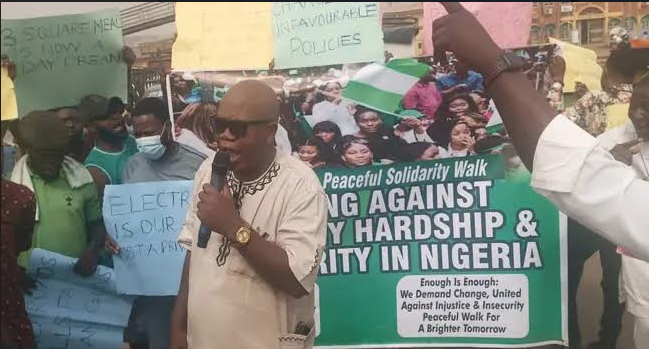By The Staff
Barring unlikely last minute concessions, protesters are set to hit the streets against hunger and hardship linked to President Bola Tinubu’s avalanche of taxes and perceived poverty – inducing policies. Episodic outbursts have already been reported in Lagos and Niger State. Lagos, Abuja, Kano, Kaduna, Benin and Port Harcourt are the most likely theatres to watch.
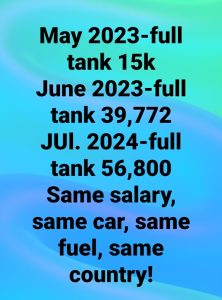
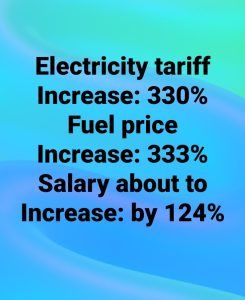 There is no knowing how the test of strength will go but, given the observable thickness of the revulsion for the government, it will surely further wreck the Tinubu leadership to the status of the Groundnut Chief. In other words, he could empirically still be in power but symbolically of little weight and worth across the country and outside.
There is no knowing how the test of strength will go but, given the observable thickness of the revulsion for the government, it will surely further wreck the Tinubu leadership to the status of the Groundnut Chief. In other words, he could empirically still be in power but symbolically of little weight and worth across the country and outside.
Intervention spoke to observers, some of them ex-close friends of the president who say that such will be the most shattering paradox Tinubu will confront in his life: he who has invested most in the instrumentality of mass protest against other politicians finding himself at the receiving end of same when in power himself.
Yet, there are no indications available to Intervention at the time of reporting that the Federal Government has any imaginative responses that could hegemonically undercut the groundswell of anger against it. Instead, it could be observed that high state officials are falling back on expired governmentality tactics of scare mongering and poor inferences.
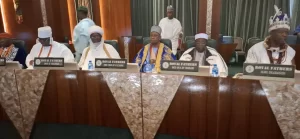
 The government said the protest has faceless mandarins, thereby implicating itself in the politics of ‘seeing’. Meanwhile, the Inspector-General of Police asserts that protesters have been imported. Whether imported or exported, the protesters have sold a binding narrative that they are out against hunger and hardship. So, critics ask why is it not the case that the government confronts the narrative rather than who is who in the protest?
The government said the protest has faceless mandarins, thereby implicating itself in the politics of ‘seeing’. Meanwhile, the Inspector-General of Police asserts that protesters have been imported. Whether imported or exported, the protesters have sold a binding narrative that they are out against hunger and hardship. So, critics ask why is it not the case that the government confronts the narrative rather than who is who in the protest?
Another peg of protest bursting tactic of the government is to territorialise the logic of the protest by saying that the North did not participate in the 2020 #EndSARS revolt. Conversely, the South should not participate in this protest. This argument assumes a homogeneous North or South where the kind of consensus inferred is ever possible. Moreover, critics ask if there is any difference between the North’s refusal to participate in #EndSARS protest in 2020 and Tinubu’s own shift of position from a pro-protest actor in 2012 to an anti-protest person in 2024? Every actor acts contingently and it is assumed that regime philosophers and ideologues understand that.
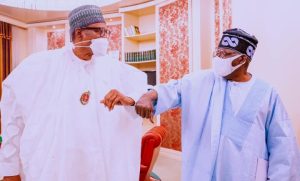
Two of a kind
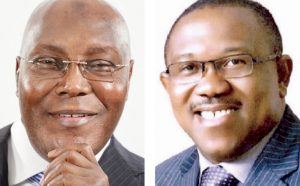
Have rightly come out to endorse the protests
Intervention has been told that the implication of falling back on expired narratives and arguments is that the Tinubu leadership has robbed itself of a much cheaper but more effective strategy of buying time by employing a dialogic process. The only good thing is that the president has not spoken, has not threatened anybody, leaving room for him to still come in as a calmer.
Otherwise, should the protests start at all, it will mark the end of any modicum of a honeymoon between a regime which eliminated that luxury on Day One of taking power with a subsidy removal pronouncement that saw thousands in a trekking spectacle on the Airport Road in Abuja, for example, a space and spectacle no one can hide from the whole world.
In a country with a well-developed culture of effective mass protest even at the peak of military authoritarianism, it remains to be seen what comes out of a protest triggered by existential fundamentals such as public transport, electricity cost, food prices, spectacle of corruption and obscenity of power. Hitherto, mass protests were against discourses such as the 1989 SAP riots, the 1978 Ali Must Go, the 1986 Ango Must Go down to the more recent ones.
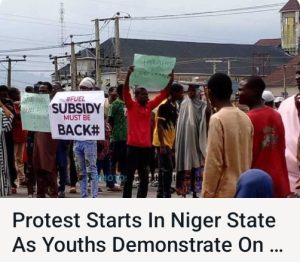
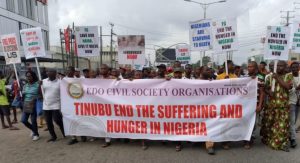
Protests have gone beyond North and South territorialisation narrative
A statement currently circulating on Facebook in the name of Chief Bode George (to be confirmed) started with a great point about the planned protest being like asking Tinubu to correct bad governance of the past 60 years but, as a senior economist observes, it is one thing to obliterate fuel subsidy but a completely different thing not to brief the nation on the paradigm package informing the action. To date, no such paradigm has been articulated by the Tinubu regime beyond resort to endless invocation of reform in an age in which the word reform is used by all manner of players to hide different forms of state capture.
Beyond the recklessness of the Day One subsidy policy is the astonishing reality of a Southwestern or Yoruba president of Nigeria for whom correcting the mess in the university system is simply not a priority. Instead, Tinubu could be said to join his predecessor in burying the universities completely. Many observers say it is unbelievable because, while it is true Obasanjo went along with the elite conspiracy against a university system worth its name, he didn’t go to the extent the two of Buhari and Tinubu have gone. While some critics grant that he repudiated the IPPS system, they point out how the president’s statement has not been implemented and nobody is queried for that. This is besides the argument that the trouble with the Nigerian university system deserving of presidential attention is crisis of orientation more than the material issue of pay, crucial as that is. The universities have been called centers of ignorance recently by those with the intellectual and moral authority to call the system so.
So, Tinubu ends up with no credit in any realm of management of power and his case is worsened by a noted tendency to punish perceived enemies. That is what complicates understanding the Tinubu regime, particularly that the regime is so completely oblivious of the campaign against the president’s person during and after the presidential elections in 2023 and the knowledge/power implications of that.
That obliviousness could be the regime’s undoing in an age in which the Nigeria Labour Congress (NLC), the student movement and middle class professionals have yielded grounds to a rather fluid ensemble of actors in mass protests, with no centre of gravity to capture and demobilize but with a much more sophisticated technology of power. Even if state repression works, one phrase from nowhere can be more devastating for a beleaguered regime. So, why is Nigeria’s most beleaguered regime ever willing to take needless risks? Who are the philosophers and ideologues of this government?

